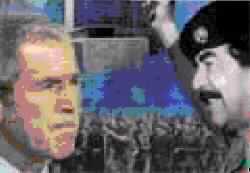HIGHLIGHTS: . Fellow veto-powers Russia and France Supported the Resolution Along with Syria, Iraq's Arab Neighbor|| France Hints at Taking Part in Military Action against Iraq Should that Become Necessary|| Russia Says Nothing in Resolution Allows Automatic Use of Force, But Complex Resolution Does Leave Washington Free to Attack Iraq without Security Council Authorisation|| Iraq Keeps World Guessing as to Response Demanded by Resolution Within 7 Days|| UN Chief Inspector Blix to Take Crew of Inspectors to Baghdad Nov. 18th , Inspectors' Work Expected to Begin Nov. 25th || STORY A relieved world welcomed Friday's U.N. Security Council resolution on Iraq as a last chance to avoid war but Baghdad kept its cards close to its chest.
The Security Council unanimously approved a tough resolution giving Iraq a chance to disarm or face serious consequences, ending weeks of tense diplomatic maneuvering by the major powers to avert a unilateral U.S. strike on Baghdad.
The United States and Britain, which co-sponsored the resolution, repeated their threats of military action if Iraqi President Saddam Hussein failed to allow U.N inspectors to dismantle his alleged arsenal of weapons of mass destruction.
But Washington's staunchest critics said their concerns about imminent war had been addressed. Fellow veto-powers Russia and France supported the resolution along with Syria, Iraq's Arab neighbor, while Germany hailed a victory for diplomacy.
"The unanimous vote by the Security Council...offers a chance to disarm Iraq peacefully," French President Jacques Chirac's office said in a statement.
France and Russia repeatedly blocked Washington's efforts to secure a mandate that would trigger war automatically if Iraq obstructed weapons inspections.
But French Foreign Minister Dominique de Villepin hinted that Paris may take part in any military action against Baghdad should it become necessary.
"If there were serious violations, obviously the Security Council would meet again and we would accept our responsibilities," Villepin told TF1 television.
The complex resolution leaves the United States free to attack Iraq without Security Council authorisation as long as inspectors have reported or verified any serious Iraqi violation and the Security Council has evaluated the complaint.
"There is no measure allowing the automatic use of force in the adopted resolution," the Russian Foreign Ministry said in a statement.
"It was possible to secure substantial change in the original draft and remove formulations unacceptable to us."
'NOT A WORD,' SAYS NAJI SABRI
Crucially, Iraq kept the world guessing about whether it would accept the U.N.'s terms. Asked in Cairo if he had any comment on the resolution, Iraqi Foreign Minister Naji Sabri said: "No, not a word."
Iraq's U.N. ambassador, Mohamed Aldouri said the resolution reflected "the will of the United States on the rest of the world" and said he was pessimistic the inspectors would ever be allowed to do their work.
The council gave Iraq one week to respond to the motion, approved in a 15-0 vote that was a victory for President Bush who has called for Saddam's ouster, accusing him of seeking chemical, biological and nuclear weapons.
Bush had threatened unilateral action against Baghdad if the U.N. failed to act, a policy that ran into fierce opposition in the Arab world and even among some U.S. allies.
But Syria, an old U.S. foe, said it had supported the motion despite reservations to preserve unity in the council.
"We got assurances and confirmation at the highest levels from France and Russia...that there is no direct action against Iraq without a return to the Security Council," Imad Shueibi, a professor at Damascus University who is close to official thinking, told Reuters.
The resolution also satisfied German Chancellor Gerhard Schroeder, who angered Washington with his vocal opposition to war during his re-election campaign in September.
"The decision...to go to the U.N. Security Council and to choose the route of multilateralism was thereby proved right," Schroeder said in a statement.
Israel's Foreign Minister Benjamin Netanyahu expressed support for the U.S. and British position in a telephone conversation with British Foreign Secretary Jack Straw, an Israeli statement said.
Iraq denies developing weapons of mass destruction and agreed in September to readmit U.N inspectors who were withdrawn in 1998 before a bombing raid by the United States and Britain.
Chief U.N. inspector Hans Blix said he would take a crew to Iraq on November 18. Inspections are not expected to begin until after November 25.
The U.N. inspectors have up to 45 days to begin work and another 60 days to report to the council on what they have uncovered. But they are obliged to report any obstructions by Iraq immediately.
British Prime Minister Tony Blair echoed Bush's position that this was Iraq's last chance. "Saddam must now make his choice. My message to him is this. Disarm or you face force. Be under no doubt whatsoever of that."
PHOTO CAPTION
A flash animation highlighting U.N. resolution dealing with weapons inspections in Iraq. (Rich Clement, Michael Sales/Reuters )
- Author:
& News Agencies - Section:
WORLD HEADLINES


 Home
Home Discover Islam
Discover Islam Quran Recitations
Quran Recitations Lectures
Lectures
 Fatwa
Fatwa Articles
Articles Fiqh
Fiqh E-Books
E-Books Boys & Girls
Boys & Girls  Women
Women










